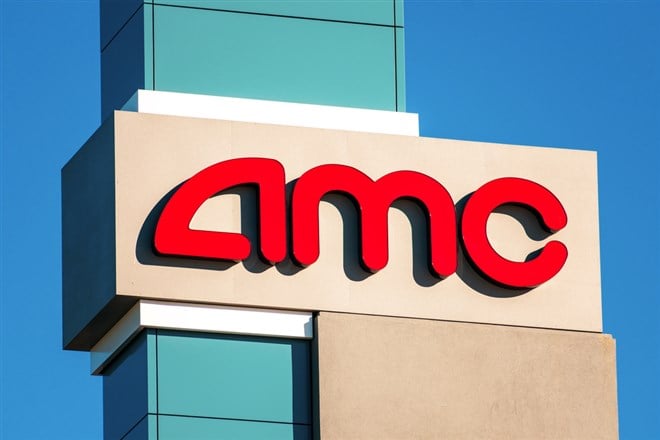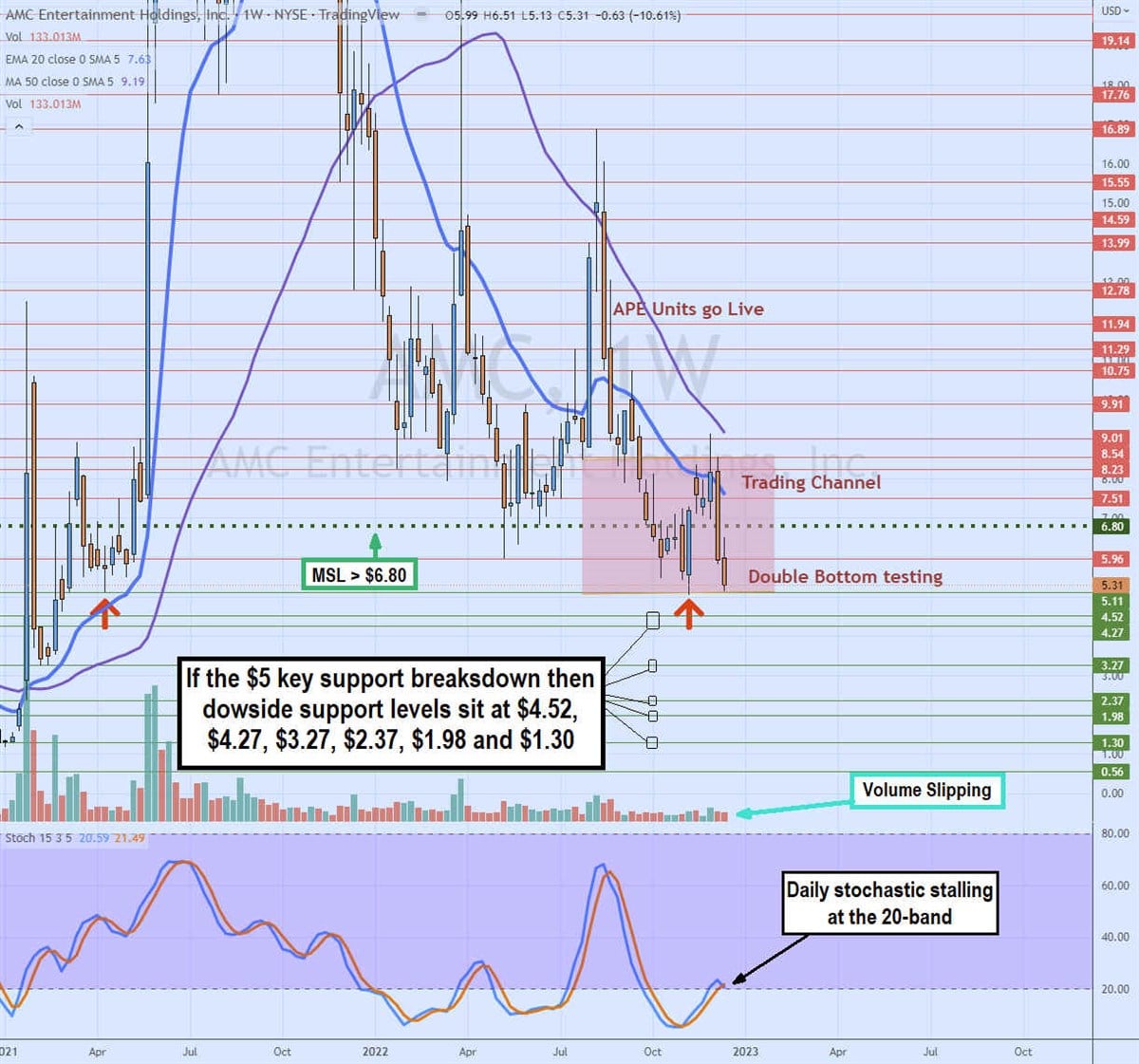
The world’s most prominent movie theater chain AMC Entertainment Holdings, Inc. (NYSE: AMC) stock has fallen (-67%) for the year, and its AMC Preferred Equity Units (NYSE: APE) shares have fallen over 90%. The meme stock craze of 2021, which includes the likes of GameStop Corp. (NYSE: GME) along with AMC stock, is all but a painful memory. The Company wasn’t able to capitalize on its short squeeze to make any dent in its debt load.
The U.S. Federal Reserve Open Market Committee (FOMC) interest rate hikes have not helped AMC either as its interest on first-lien secured debt due in 2026 has risen from 3.10% at the beginning of the year to 5.76% by the end of its Q3.
While the reopening has brought movies goers into its theaters driven by blockbuster releases like The Batman and Black Adam from Warner Bros. Discovery, Inc. (NYSE: WBD) and Top Gun: Maverick from Paramount Global (NASDAQ: PARA), the traffic is still down about a third from pre-pandemic levels. The Company has been able to expand to 950 theaters with 10,500 screens and plans to issue a credit card in Q1 2023 along with an AMC line of popcorn to hit grocery shelves.
The Company claims it will be a positive cash flow by the year's end with blockbuster releases in Q4 2022 that include Avatar 2 and Black Panther: Wakanda Forever from The Walt Disney Company (NYSE: DIS). It’s hoped that the experience will outstrip the convenience of streaming movies, especially as they get streamed even sooner.
The Last Man Standing Curse
While there is a halo effect for companies that are seen as “the last man standing,” but there is a risk of being obsolete as there’s usually a reason why the competition died out. The last man standing is a status that usually applies to companies in a dying industry, just like Blockbuster Video. Netflix, Inc. (NASDAQ: NFLX) saw the future in streaming video, and it was the nail in the coffin for Blockbuster.
The digital music migration has eliminated the CD music business and record stores. The migration to digital readers and tablets has nearly eliminated bookstores and printed newspapers. The COVID pandemic accelerated the migration to streaming movies which have permanently buried movie theaters. Best Buy Co. Inc (NYSE: BBY) is the last man standing for consumer electronics, but that has worked for them. Analysts from Loop to Citigroup have been cutting AMC price targets down to around $1, with Credit Suisse giving it a $0.95 price target as recently as Oct. 31, 2022.
Q3 Calm Before the Storm?
On November 8, 2022, AMC released its fiscal third-quarter 2022 results for September 2022. The Company reported an earnings-per-share (EPS) loss of (-$0.20), excluding non-recurring items versus consensus analyst estimates for a loss of (-$0.25), beating estimates by $0.05.
Revenues rose 26.9% year-over-year (YoY) to $968.4 million beating $960.97 million consensus analyst estimates. The Company still had $115 million in operating losses for a total (-$225 million) in quarterly losses. Total losses for 2022 was $700 million with (-$750 million) in total cash burn. The Company ended the quarter with $905.2 million in total assets of which includes $685 million in cash and cash equivalents. The company will have $1.6 billion at the end of 2021.
Fall of the APEs
AMC declared a dividend in the form of AMC Preferred Equity (APE) units that began trading on Aug. 22, 2022. The APE units' purpose was to sell them in the open market to raise cash to pay down its debt without further diluting the stock.
However, since it was basically like a stock split, it didn’t technically dilute the shares but definitely diluted the price. APE units were supposed to be used as currency to raise cash, but the Company has failed to raise enough cash as APE units fell from a high of $10.50 on Aug. 22, 2022, to $0.73 on Dec. 16, 2022. AMC shares fell from $13.09 to $5.31 in the same period. Price dilution, not share dilution, is what hurt investors the most.
Meanwhile, the Company barely raised any monies even to impact the interest payments on its massive $12 billion debt load comprised of $5.3 billion in debt, $4.43 billion in leases, and $2.6 billion in other debt. There are concerns for a capital raise in 2023, but chances are slim that shareholders would approve more dilution in either shares or price.
Amazon to the Rescue?
On Nov. 23, 2022, rumors spread that Amazon.com Inc. (NASDAQ: AMZN) would spend $1 billion to produce 12 to 15 movies annually for movie theaters starting in 2023. This makes sense due to its history of spending heavily on original content, which includes nearly $13 billion in 2021 and $11 billion in 2020. It also acquired the iconic MGM Studios for $8.45 billion.
For years, there’s been speculation and wishful thinking that Amazon would be the proverbial white knight to rescue AMC Entertainment in an acquisition. Amazon does have over $58 billion in cash, and adding another $12 billion to its $164 billion in long-term debt would be a drop in the bucket. Its commitment to releasing theatrical motion pictures is keeping rumors alive that AMC could be a solid distribution channel to add to its eco-system. Time is on Amazon’s side, as the longer, it waits, the cheaper an acquisition would be if it were to happen.

Big Double Bottom Test
The weekly candlestick charts point out the critical double bottom test for AMC stock near $5. It’s last spike to $9.15 on Dec. 1, 2022, saw it plunged (-43%) to a low of $5.13 in two weeks. Tax-loss selling is inevitable heading into the end of the year as investors adjust portfolios to harvest losses. AMC shares once again approach the swing lows that held in April of 2021 and October of 2022. The weekly 20-period exponential moving average (MA) resistance continues to fall at $7.63 followed by the weekly 50-period MA resistance at $9.19. The weekly stochastic is stalling at the 20-band to either cross back down or form a mini pup back up. The weekly market structure low (MSL) triggers on a breakout through $6.80. Volume has been on the light side. Pullback support levels on a $5 breakdown sit at $4.52, $4.27, $3.27, $2.37, $1.98, and $1.30.




